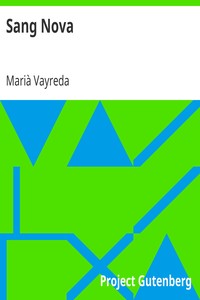Sang Nova by Marià Vayreda
"Sang Nova" by Marià Vayreda is a novel written in the late 19th century. The narrative introduces us to Ramón de Montbrió, a young man returning to his familial home after completing his studies, seeking to reconnect with his roots while grappling with the expectations of his uncle, Mossèn Joan. The story explores themes of tradition versus modernity, the tension between personal aspirations and familial ties, and the evolving role of education
and career choices. At the start of the novel, the relationship between Ramón and his uncle is central to the narrative. Ramón receives a heartfelt letter from Mossèn Joan, revealing his uncle’s desire for him to follow a more traditional path, specifically in the ecclesiastical field, in contrast to Ramón's ambitions of studying engineering. The opening chapters highlight Ramón's journey back home, his reflections during the travel, and the contrasting views he holds against his uncle's more conservative beliefs. This tension sets up a compelling exploration of their dynamic, while also introducing colorful secondary characters such as Pascal, the loyal recader, and Feliça, the housekeeper, who play significant roles in the unfolding family drama. (This is an automatically generated summary.)
Read or download for free
| How to read | Url | Size | |||
|---|---|---|---|---|---|
| Read now! | https://www.gutenberg.org/ebooks/23021.html.images | 625 kB | |||
| EPUB3 (E-readers incl. Send-to-Kindle) | https://www.gutenberg.org/ebooks/23021.epub3.images | 322 kB | |||
| EPUB (older E-readers) | https://www.gutenberg.org/ebooks/23021.epub.images | 333 kB | |||
| EPUB (no images, older E-readers) | https://www.gutenberg.org/ebooks/23021.epub.noimages | 313 kB | |||
| Kindle | https://www.gutenberg.org/ebooks/23021.kf8.images | 535 kB | |||
| older Kindles | https://www.gutenberg.org/ebooks/23021.kindle.images | 508 kB | |||
| Plain Text UTF-8 | https://www.gutenberg.org/ebooks/23021.txt.utf-8 | 583 kB | |||
| Download HTML (zip) | https://www.gutenberg.org/cache/epub/23021/pg23021-h.zip | 320 kB | |||
| There may be more files related to this item. | |||||
Similar Books
About this eBook
| Author | Vayreda, Marià, 1853-1903 |
|---|---|
| Title |
Sang Nova Novel, la muntanyenca (Volumes 1 and 2) |
| Note | Wikipedia page about this book: ca.wikipedia.org/wiki/Sang_nova |
| Reading Level | Reading ease score: 54.1 (10th to 12th grade). Somewhat difficult to read. |
| Language | Catalan |
| LoC Class | PC: Language and Literatures: Romance languages: Italian, French, Spanish, Portuguese |
| Subject | Fiction |
| Category | Text |
| EBook-No. | 23021 |
| Release Date | Oct 13, 2007 |
| Copyright Status | Public domain in the USA. |
| Downloads | 296 downloads in the last 30 days. |
| Project Gutenberg eBooks are always free! | |

